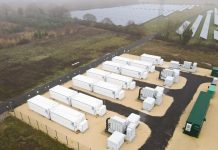
UK households and businesses have to understand that using as much power as they like, when they like, may soon become an expensive option, according to Ofgem senior partner for networks Andrew Wright.
As the system moves away from fossil fuels and spare capacity towards a low carbon mix that also has to provide more power for electric vehicles – and, potentially heating – flexible consumption of power will be necessary to keep the system stable. Wright suggests the impact for consumers may be profound.

“Society will need to rethink its approach to electricity use,” he said in a blog post on the regulator’s website this week. While that was “not necessarily in a way that compromises our way of life”, he warned that “in the future, we may need to find new ways of paying for and providing access to the electricity system that meets society’s expectations of fairness and reliability.”
While essential use of power should be safeguarded for everyone, he said, “this probably means that those that want access to much more firm capacity than is usual might need to pay extra for it.”
Wright called for public debate about time of use tariffs and the need for householders to think about when they consume power to begin sooner rather than later.
The call comes as BEIS and Ofgem consult on the UK’s approach to building a smarter, more flexible power system. Within that consultation, government indicated it will decide whether to mandate all businesses and households are metered and settled half hourly by 2018.
If it does, all power users will be exposed to peak and off peak pricing, although the consultation notes “the most vulnerable customers [will be] afforded suitable protections to ensure they are not made worse off by a more flexible electricity system”.
However, while smart meters will be an essential component of that strategy, and suppliers are mandated to ‘take all reasonable steps’ to offer them to all customers, householders currently do not have to accept a smart meter. Convincing them to allow suppliers to install smart meters will be critical if time of use tariffs and peak pricing are to be introduced across the UK.
According to Energy UK, around 5 million smart meters have been installed to date, out of almost 30m households.
British Gas has installed the lion’s share (around 3.5m from a customer base of 10m). Eon, which has around 4.6m customers, has installed “more than 750,000 smart meters”, according to a spokesperson. SSE, which has around 8 million customers, told The Energyst it has installed around 400,000. At the end of 2016 Npower had installed 130,000 smart meters of a customer base of 2.8m. EDF, with 5 million customers, said it has installed 150,000 to date.
Scottish Power was the only ‘big six’ supplier that did not answer requests for comment, but its latest results stated it has installed 240,000 of a customer base of 5 million, with plans to install 2,500 smart meters a day in 2017.
While smart meter costs are currently being implicated in the latest round of energy price rises, none of the suppliers would comment on the average cost of a smart meter installation. According to latest government forecasts, the average cost of a dual fuel meter install is £107. While suppliers are concerned about the rising toll, BEIS is sticking to its assumptions for the total cost of the rollout, circa £11bn, which will be recovered via energy bills.
However, SSE recently warned that the delay to the smart meter central communications infrastructure (the data communications company or DCC) had compressed the rollout timetable and was “driving up costs and creating challenges for the industry”. It called on policymakers and regulators to honour “the commitment to the offer of a smart meter to all by 2020” but not insist upon suppliers “taking all reasonable steps” to install a meter.
Update: Ofgem has given some clarification on suppliers being required to take ‘all reasonable steps’ in offering all customers a smart meter. It states:
“The smart meter rollout will require suppliers to engage with every home in GB and offer them a smart meter. We haven’t set out a definition for ‘all reasonable steps’ but have described for suppliers areas that they should consider. For example, they should test and trial different ways of contacting customers and making appointments for a smart meter installations, and ensure that they have appropriate contracts in place both for the purchase of smart meters and the people who will to install them.”
Related stories:
SSE urges smart meter rethink as costs spiral and benefits tank
Government sets out smart grid stall – moots peak power pricing for everybody
Artificial intelligence for smart grids: Can UK start-up beat Google?
Ofgem: Power flexibility will become more important than energy efficiency
Battery storage: Positive outlook?
Centrica: Floodgates to open on battery storage in 2017
UK must prioritise smartgrid, says National Infrastructure Commission
Government: Energy storage ‘top priority’ ahead of smart systems consultation
Public facilities ‘shutting down’ due to rising energy costs
Businesses ‘shutting down from 4pm-7pm due to peak power costs
Free report: DSR and battery storage
Free report: Financing energy efficiency
Free report: 2017 business energy risks
Free report: The heat report 2016
Click here to see if you qualify for a free subscription to the print magazine, or to renew.
Follow us at @EnergystMedia. For regular bulletins, sign up for the free newsletter.




As a consumer, I will be resisting the installation of a smart meter – they’re smart for the seller, not the buyer…nice try.